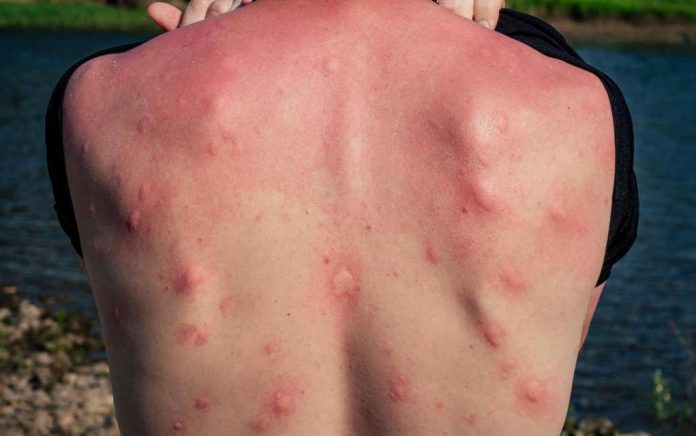(SurvivalDaily.com) – Whether you’re an avid outdoorsman or a casual camper, one thing we all have in common is that we don’t like bug bites. Let’s be honest, bugs are super annoying as it is, but when they bite you it takes that to another level. Not to mention bites can cause discomfort and in some cases health concerns. So how can you avoid getting bit by insects?
Watch Where You Set Your Gear
Possibly one of the simplest ways to avoid getting unwanted attention from your friendly neighborhood pests is simply to watch where you put your gear. Leaving boots, gloves, hats, and articles of clothing in an area for too long results in some unwanted tenants moving in.
Scorpions, spiders, and centipedes are notorious for crawling into these items in search of new real estate. So the best thing you can do to avoid getting bit is to keep your gear in one area, away from possible pests. Don’t leave your gear outside overnight, don’t leave your jacket hanging in a tree, and don’t leave your boots on the ground or outside for extended periods of time.
Protective Plants
Some plants can provide you with a natural barrier against bugs. Mint can be used to deter spiders and mosquitoes, all while adding a nice scent. Simply roll the leaves over your skin and gear. Other plants providing protection include:
-
Paw Paw
Commonly found along rivers and waterways on the Eastside of the US, paw paw provides edible fruit and insect repellent. Crush and wipe the leaves on your skin and gear to deter bugs. Spring and early summer provide the best leaves with a strong scent that reminds people of fresh asphalt. No wonder insects don’t like it.
-
Catnip
Also a member of the mint family, not only does it provide your cat with a high and you with tea, it also serves as an insect repellent. The simplest way to ensure bugs won’t bother you is to crush and rub the leaves and stems on your skin and gear, effectively repelling mosquitoes and other flying pests.
-
Pineapple Weed
While this flower doesn’t look like a pineapple, it does smell like one. Commonly found near disturbed ground such as roadways, these plants offer feathery leaves and soft stems to provide repellent. Just crush and rub the plant against your skin and clothes. It will repel insects, especially mosquitoes.
Smoke
Don’t worry, you don’t have to actually smoke anything (though, some fishermen claim to smoke cigars as a way to keep biting insects at bay). Cattails are a great way to weaponize smoke against insects as well. Simply light the end and smoke will begin to come out. Place the burning cattails upwind from you and allow the smoke to cover you.
Cedar chips are known to smolder rather than burst into flames, making them a great way to smoke out bugs. Not to mention the fact you can actually transfer the embers from one location to another, properly and safely of course. Cedar is already known for its bug-repelling characteristics, why not double that by lighting it on fire?
Mud
Unleash your inner Arnold Schwarzenegger from the movie Predator and cover yourself with mud! It’s a bit of an extreme measure, but certain environments may require it. Covering yourself and allowing the mud to harden into a thin but stiff layer will provide you with armor bugs can’t penetrate. As in the movie Rambo and Predator mud also provides great camouflage. Not only does it conceal you visually, it also masks your scent, which is especially useful when hunting.
DIY Repellent
It may not be the best option out there, but it’s still an option nonetheless. You can use essential oils and other household products you can find in stores to create your very own insect repellent. You don’t even have to leave the comfort of your home. Just order the supplies online! Add these ingredients into a one-quart spray bottle and shake well:
- One pint of distilled white vinegar
- One pint of water
- 25 drops of tea tree oil
- 25 drops of lavender oil
After you’ve mixed the ingredients together spray your clothes, boots, gear, and skin liberally, then reapply every 2-4 hours for best results.
There you have it! Five ways to avoid getting bit by bugs. After all, the best way to avoid something is to prevent it altogether. Now you can camp in comfort. Just make sure you’re not allergic to any plants or oils before applying to your skin.
~Copyright 2021, SurvivalDaily.com

















